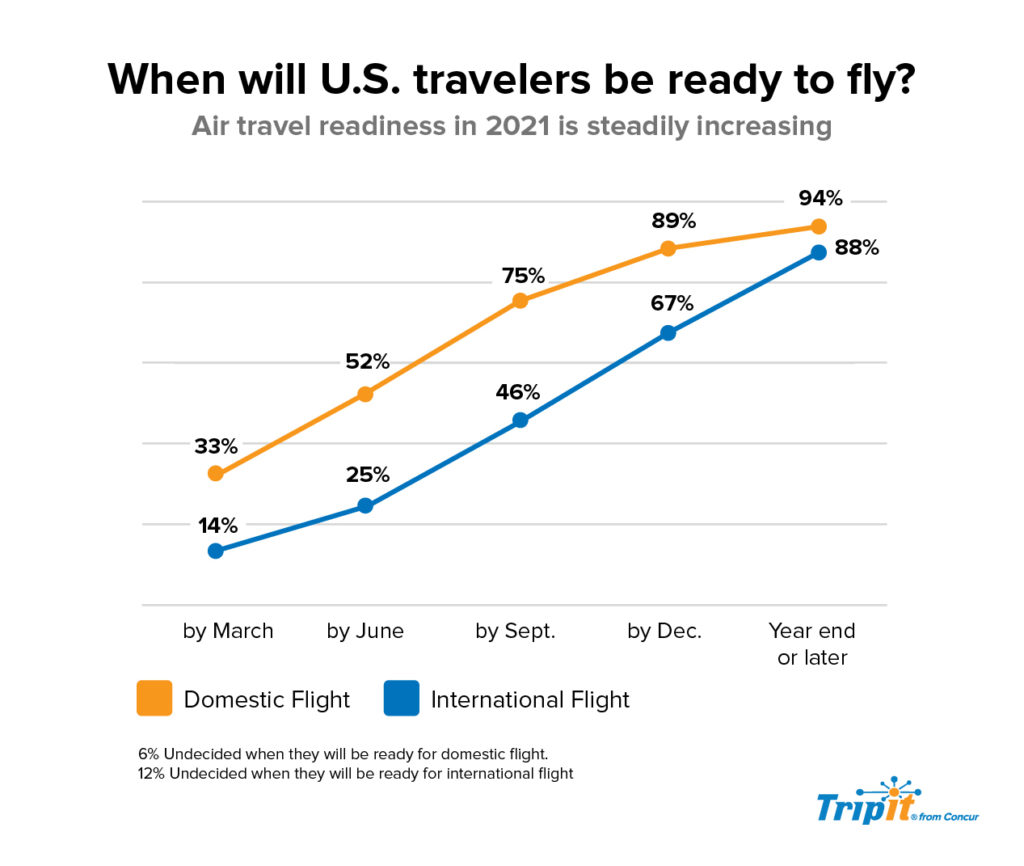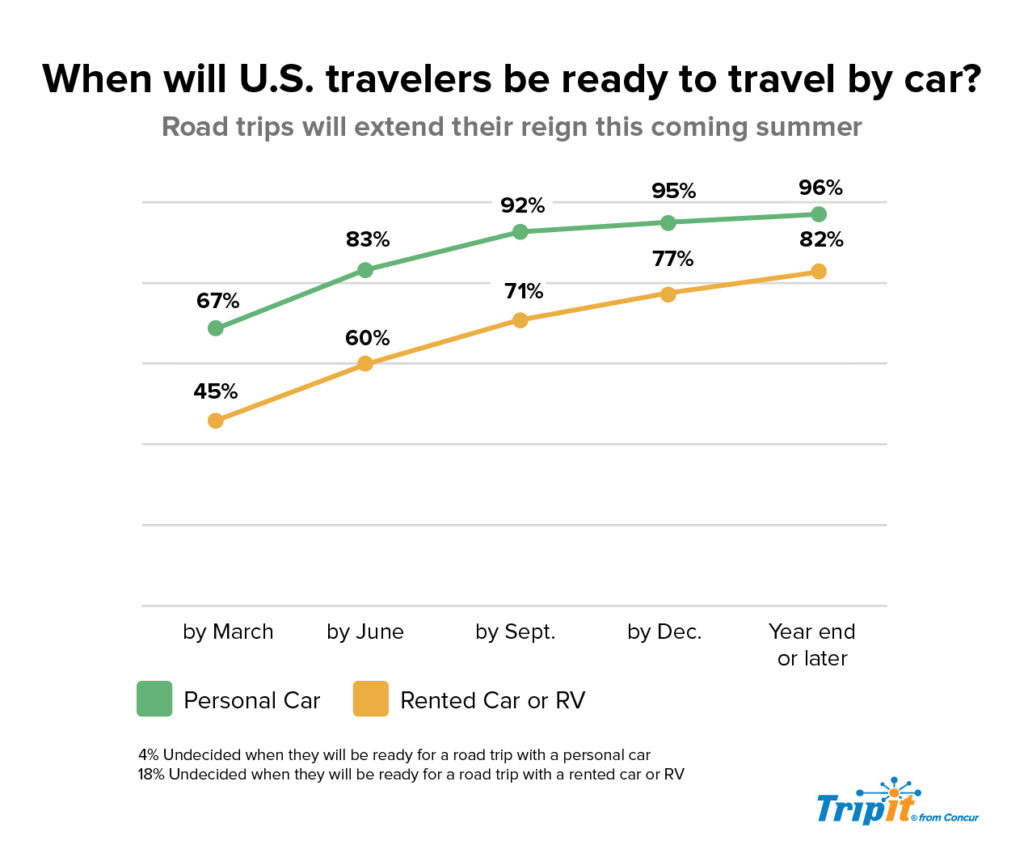
After a year at home, nearly all U.S. travelers plan to take a trip in 2021. Yes, you read that correctly. In a survey of more than 3,200 TripIt users based in the U.S., 94 percent of respondents said they plan to travel in 2021.
Americans’ pent-up travel aspirations very well may lead to a (domestic) summer travel resurgence. But how travelers plan to make their domestic treks is still up in the air. Our survey data shows that air travel readiness in 2021 is steadily increasing—yet, many Americans are planning a road trip for summer’s three biggest holidays (that is, Memorial Day, Fourth of July, and Labor Day).
Summer travelers are readying for takeoff
As of this month, 33 percent of travelers said they'd be ready to take a domestic flight, and 14 percent said they’d be ready to take an international flight.

But as the weather warms, so do travelers’ feelings towards air travel.
Looking ahead to June, traveler readiness to fly steadily increases for both domestic and international flights. By then, 52 percent of travelers said they’d be ready for a domestic flight and 25 percent indicated that they’d be ready to take an international flight.
What’s getting travelers back on the road?
Of the 94 percent of survey respondents that said they plan to travel in 2021, taking a vacation was the most popular reason to travel (73 percent), followed by a trip to visit family and/or friends (53 percent), and a business trip (43 percent).
Of those planning a vacation or bucket list trip, a majority expect to fly for those trips—58 percent and 82 percent, respectively. Based on survey data, however, it looks more likely that those trips via plane will happen later in the fall or winter.
Here’s how else travelers plan to get to their destinations this year:

The road trip trend is here to stay—and could be bigger than ever
Road trips—the summer travel 2020 stalwart—are likely to extend their reign this coming summer. According to our survey data, 83 percent of respondents said they’d be ready for a road trip with a personal car by June; 60 percent of respondents said they’d be ready to take a road trip with a rented car or RV by June. That’s more than twice as many travelers expressing readiness to take a road trip with their own car versus boarding a domestic flight.

Of those planning to take a vacation (73 percent of all respondents), a majority (58 percent) said they plan to fly for those trips at some point in 2021. Meanwhile, summer travelers plan to drive for the big three:
- Of those planning to travel for Memorial Day, 64 percent of travelers plan to drive
- Of those planning to travel for Fourth of July, 64 percent plan to drive
- Of those planning to travel for Labor Day, 61 percent plan to drive
Why might travelers plan to drive for these holidays? For some, it might be the accessibility of their destination; for others, it might be the desire to avoid the crowds associated with flying over these particular weekends. Either way, Americans are inspired to travel in new ways—and that may be here to stay.
Building confidence in returning to flying
So, what factors influence traveler confidence and readiness to return to the air? We asked survey participants what mattered most to them, and they told us that vaccines and airlines and airports having procedures in place to reduce infection spread were their top needs to feel comfortable flying.
Here’s what else travelers told us:
Vaccines are building traveler confidence—but actual vaccinations matter, too
Fifty-nine percent of travelers said news about the progress of the vaccine made them more likely to book travel. Just 8 percent of travelers said a vaccine would not change their willingness to travel.
However, while vaccine efficacy and approval have given travelers a boost in confidence, we know that for many it will ultimately come down to shots in arms. Thirty-five percent of travelers said they will wait to fly again until they get vaccinated.
The prospect of some type of digital health passport that provides proof that you’ve been vaccinated appeals to 81 percent of travelers. Those travelers said they’d be willing to use a digital health passport if it meant they could travel freely.
Airline and airport procedures help build confidence
Fifty-four percent of travelers said airlines having procedures in place to reduce infection spread, such as mask requirements, reduced capacity on flights, sanitation procedures, and temperature checks, contribute to their confidence in returning to air travel.
In addition, 50 percent of travelers said airport procedures—that is, social distancing guidelines, touchless check-in procedures, mask requirements, and sanitation procedures—help them feel more comfortable taking a flight.
And we’ve already seen some of these measures put in place. Earlier this year, the Biden Administration issued an order mandating masks on planes (as well as buses, trains, and other forms of public transportation) traveling into, within, or out of the U.S. Masks are also required in all transportation hubs, including airports as well as rail and bus stations. While this mask mandate should help boost traveler confidence based on our data, other factors, like reduced capacity and touchless check-in procedures, should also further support traveler confidence at the airport and while in flight.
The more travelers know about their destination(s)—before booking—the better
According to our data, almost 70 percent of travelers said they want to know about destination-specific travel requirements before booking or during the trip planning process—and that having an online tool to support their planning would be highly beneficial.
TripIt Pro users can now research pandemic-related information for destinations ahead of booking a trip. You can search our COVID-19 Travel Guidance feature for the latest guidelines, restrictions, and requirements for the places you’re planning to visit without needing them to be part of a TripIt itinerary. This includes current infection rates, quarantine rules upon arrival, testing requirements, and other information travelers need to know before visiting the area.
Flexible travel policies influence traveler readiness
Over the course of the pandemic, we’ve seen travel providers like airlines and hotels offering unprecedented flexibility when it comes to changing and canceling travel plans. And making that information easily accessible is key to supporting traveler readiness.
Forty-six percent of travelers said having easy access to travel provider cancellation or refund policies—that is, knowing and understanding their options for modifying and/or canceling travel plans related to the pandemic—is among the most helpful tools for returning to travel.
With 2021 plans still up in the air, one thing is certain: Sustained momentum in air travel confidence hinges on continuing to put travelers’ health and safety first. Airline and airport procedures, availability of vaccines (and vaccinations), as well as having the tools to book flexible travel plans will all play a role in travelers returning to the skies this summer—and beyond.
Methodology: TripIt surveyed more than 3,200 U.S.-based users to understand their 2021 travel plans. The survey took place in December 2020.

